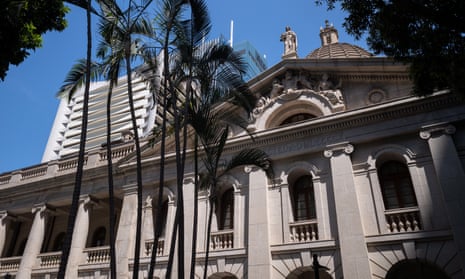International judicial figures including the former UK attorney general Sir Robert Buckland have warned the remaining British, Australian and Canadian judges operating in Hong Kong that they are working in an environment where judicial independence has been wholly undermined and the Chinese Communist party can dictate the outcome of cases.
The group has backed a legal opinion that says the systematic threats to Hong Kong’s judicial independence will continue to intensify, and that the continued presence of overseas judges is being used by the territory’s government as a vote of confidence.
As attorney general, Buckland initiated the government review that led the foreign secretary, Liz Truss, to announce in March that serving UK-appointed judges would no longer sit in Hong Kong’s top court, the court of final appeal. Two British supreme court judges resigned immediately, but in a joint statement six Hong Kong-appointed British judges resisted standing down, saying they believed their “continued participation” as overseas judges was “in the interest of the people of Hong Kong”. Two other judges, from Canada and Australia, also agreed to stay on.
The legal opinion is clearly intended to make the judges think again, although, in respect to their independence, it does not explicitly call for them to stand aside.
Other signatories include the human rights lawyer Helena Kennedy; Alex Carlile, a former independent reviewer of UK terrorist legislation; Prof Irwin Cotler, a former attorney general of Canada; Guy Mansfield, a former chairman of the UK Bar Council; the war crimes prosecutor Sir Geoffrey Nice; and Michael Kirby, a former justice of the high court of Australia.
It details how judicial independence in Hong Kong is in headlong retreat, and how the overseas judges have very limited power in practice to reverse the process.
It says China’s National People’s Congress standing committee has been issuing its own interpretations of the territory’s mini-constitution, the Basic Law, that the Hong Kong judges have gradually accepted as binding upon them. The 43-page legal opinion says the Communist party is using these interpretations to pre-empt imminent or pending litigation in Hong Kong.
Pro-Beijing actors, including Hong Kong legislators, threaten to reduce the Hong Kong courts’ jurisdiction of cases if they are not handled in the interest of the Communist party, it adds. “The overseas judges have no security of tenure and face the permanent threat that cases will be removed to the mainland criminal law system [and as a result] there has been a trend toward greater judicial deference toward the executive in ways that deviate from established legal principles.”
The legal opinion adds that the continued presence of overseas judges “is of considerable reputational benefit to the Hong Kong government, which has repeatedly asserted [that] the continued presence of [the judges] amounts to a vote of confidence in the Hong Kong courts as whole”.
It says that in practice the number of appeals reaching the overseas judges is very limited, with many cases being dropped in suspicious and troubling circumstances.
The six judges who signed the statement saying they were staying on in Hong Kong no longer work full-time in British courts. They are Lord Phillips of Worth Matravers, Lord Neuberger of Abbotsbury, Lord Sumption, Lord Walker of Gestingthorpe, Lord Collins of Mapesbury, and Lord Hoffmann. It is rare for judicial figures to air their professional differences in this way
Chung Ching Kwong, the Hong Kong coordinator for the Inter-Parliamentary Alliance on China, said: “It is a mark of how serious the situation is back home that so many judicial figures have broken ranks to sign this opinion. I have friends in prison for encouraging people to light candles. This is the system that the judges are legitimising. Democracy protesters want these judges out of Hong Kong.”
